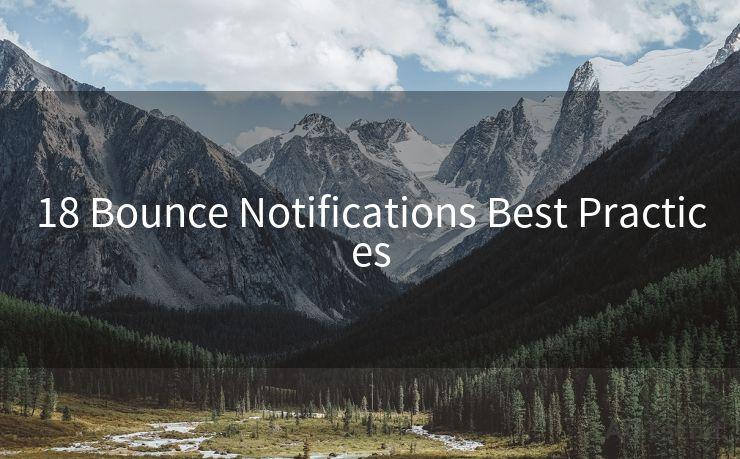18 Bounce Notifications Best Practices




Email bounce notifications are an important aspect of email marketing. They inform senders when an email fails to reach its intended recipient, helping marketers maintain a clean and healthy email list. In this article, we'll explore 18 best practices for handling bounce notifications to ensure your email marketing efforts are as effective as possible.
1. Understand Bounce Types
There are two main types of email bounces: hard bounces and soft bounces. Hard bounces occur when an email address is invalid or doesn't exist, while soft bounces happen due to temporary issues like a full inbox or server problems. Understanding the difference is crucial for effective bounce management.
2. Monitor Bounce Rates Regularly
Keep a close eye on your bounce rates. A sudden increase could indicate a problem with your email list or sending practices.
3. Maintain a Clean Email List
Regularly clean your email list by removing hard-bounced addresses. This helps maintain a healthy list and improves email deliverability.
4. Use Double Opt-In
Implementing a double opt-in process for new subscribers helps verify email addresses and reduces the chances of future bounces.
5. Segment Your Email List
Segmenting your email list based on engagement can help identify and separate active subscribers from inactive ones, reducing bounce rates.
6. Optimize Email Content
Ensure your emails are relevant, engaging, and well-designed to reduce the chances of recipients marking them as spam, which can lead to increased bounce rates.
7. Test Email Deliverability
Regularly test your emails to ensure they're reaching inboxes and not being flagged as spam. Use tools like MailTester or GlockApps for this purpose.
8. Avoid Spam Triggers
Be cautious of spammy words and phrases in your email content, subject lines, and even email addresses that might trigger spam filters.
9. Use a Reliable Email Service Provider (ESP)
Choose an ESP with a good reputation and advanced bounce handling features. This can significantly improve your email deliverability.
10. Handle Soft Bounces Appropriately
Don't immediately remove soft-bounced email addresses from your list. Instead, try resending emails after a period of time or consider alternative delivery strategies.
11. Validate Email Addresses
Use email validation tools to check the syntax and domain validity of email addresses before adding them to your list.
12. Monitor Feedback Loops
Subscribe to feedback loops provided by ISPs to receive notifications when recipients mark your emails as spam. This helps identify and address potential issues.
13. Implement DKIM and SPF
These email authentication protocols help improve email deliverability by verifying the sender's identity.
14. Avoid Purchased or Rented Lists
These lists often contain invalid or spam-trap addresses, leading to high bounce rates. Focus on organic list building instead.
15. Use a Consistent From Address
Maintaining a consistent "from" address helps build trust with ISPs and improves email deliverability.
16. Handle Unsubscribes Gracefully
Provide an easy way for recipients to unsubscribe, and respect their wishes when they do. This reduces spam complaints and bounce rates.
17. Stay Up to Date on Email Marketing Best Practices
Email marketing is constantly evolving. Stay informed about the latest trends and best practices to ensure your emails reach their intended recipients.
18. Regularly Audit Your Email List
Periodically review your email list for inactive or bouncing addresses and remove or reactivate them as necessary.
🔔🔔🔔
【AOTsend Email API】:AOTsend is a Managed Email Service for sending transactional emails. Support Email Types: reminders, authentication, confirmations, notifications, verification codes, invoices, password resets, account activations, billing statements, two-factor authentication (2FA), and one-time passwords (OTP) emails, etc. $0.28 per 1000 Emails. 99% Delivery, 98% Inbox Rate.
You might be interested in:
Why did we start the AOTsend project, Brand Story?
What is a Managed Email API, How it Works?
Best 25+ Email Marketing Platforms (Authority,Keywords&Traffic Comparison)
Best 24+ Email Marketing Service (Price, Pros&Cons Comparison)
Email APIs vs SMTP: How they Works, Any Difference?
By following these 18 best practices for bounce notifications, you can significantly improve your email marketing efforts and ensure your messages are reaching the intended audience. Remember, a healthy email list is key to successful email marketing.





Scan the QR code to access on your mobile device.
Copyright notice: This article is published by AotSend. Reproduction requires attribution.
Article Link:https://www.mailwot.com/p6246.html



